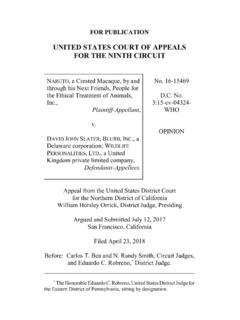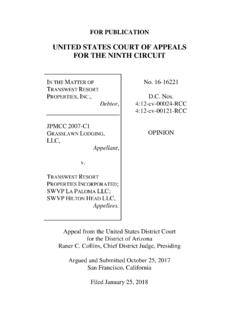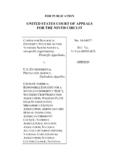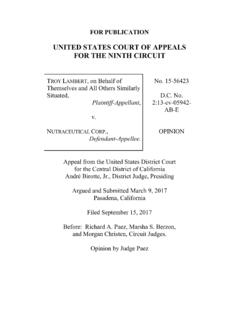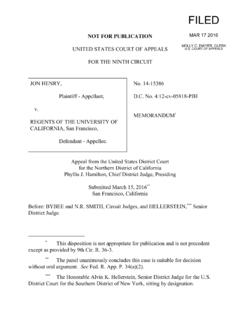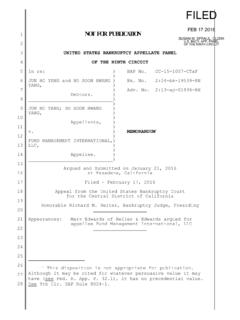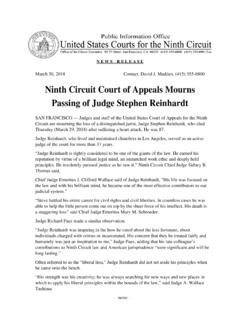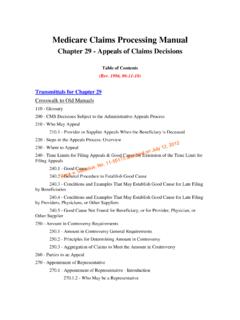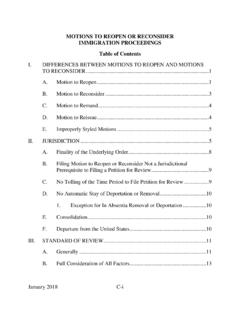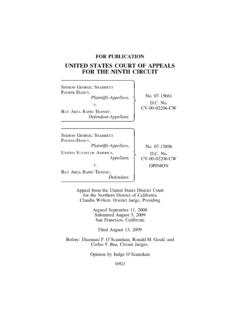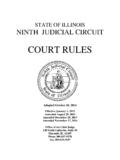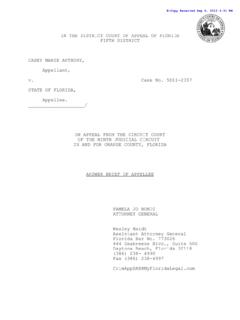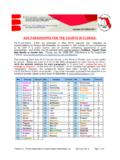Transcription of UNITED STATES COURT OF APPEALS FOR THE NINTH …
1 FOR PUBLICATION UNITED STATES COURT OF APPEALS FOR THE NINTH circuit KENNETH LAYNE MORRILL; MORRILL & ARONSON, , an Arizona professional limited liability company, Plaintiffs-Appellants, v. SCOTT FINANCIAL CORPORATION, a North Dakota corporation; BRADLEY J. SCOTT, an individual; KEMP, JONES & COULTHARD, LLP, a Nevada limited liability partnership; HARRISON, KEMP & JONES CHARTERED, a Nevada professional corporation; J. RANDALL JONES, Defendants-Appellees. No. 14-16922 No. 2:14-cv-00922-HRH OPINION appeal from the UNITED STATES District COURT for the District of Arizona H. Russell Holland, Senior District Judge, Presiding Argued and Submitted October 19, 2016 San Francisco, California Filed October 23, 2017 2 MORRILL V.
2 SCOTT FINANCIAL Before: Andrew J. Kleinfeld and Milan D. Smith, Jr., circuit Judges, and John A. Kronstadt,* District Judge. Opinion by Judge Kronstadt; Dissent by Judge Kleinfeld SUMMARY** Personal Jurisdiction The panel affirmed the district COURT s dismissal due to lack of personal jurisdiction over any defendant of an action brought by an attorney and his law firm, alleging claims for abuse of process and wrongful institution of civil proceedings. The plaintiffs resided, or were located, in Arizona, and they brought claims in the District of Arizona. The defendants were a North Dakota corporation and its sole shareholder and officer, and a Nevada attorney and law firms.
3 The panel applied the three-part test for specific personal jurisdiction. Under the first prong, the panel applied the purposeful direction test because the nature of the underlying claims arose from alleged tortious conduct. The panel held that defendants actions were not purposefully directed at * The Honorable John A. Kronstadt, UNITED STATES District Judge for the Central District of California, sitting by Designation. ** This summary constitutes no part of the opinion of the COURT . It has been prepared by COURT staff for the convenience of the reader. MORRILL V. SCOTT FINANCIAL 3 Arizona.
4 The panel further held that to establish personal jurisdiction over defendants in this action, plaintiffs were required to make a prima facie showing that defendants alleged actions were directed at Arizona, not just at individuals who resided there, and plaintiffs failed to do so. The panel rejected plaintiffs contention that the purposeful availment test also applied to this case. First, the panel held that the claims at issue were premised on alleged tortious conduct by defendants, and therefore, the purposeful availment test did not apply. Second, the panel held that even if the test applied, plaintiffs allegations as to the relevant conduct were insufficient to show purposeful availment.
5 Judge Kleinfeld dissented because he concluded that the majority misinterpreted, and misapplied, the law. Judge Kleinfeld would hold that the district COURT erred in finding that it could not exercise personal jurisdiction over defendants. COUNSEL Kenneth Layne Morrill (argued), Morrill & Aronson PLC, Phoenix, Arizona, for Plaintiffs-Appellants. Anthony S. Vitagliano (argued), Phoenix, Arizona; Ed Hendricks Jr., Meyer Hendricks PLLC, Phoenix, Arizona; for Defendants-Appellees. 4 MORRILL V. SCOTT FINANCIAL OPINION KRONSTADT, District Judge: K. Layne Morrill ( Morrill ), an attorney who resides in Arizona, and the law firm where he practices, Morrill & Aronson, ( Morrill & Aronson ), which is also located in Arizona (collectively Plaintiffs ), brought claims in the District of Arizona for abuse of process and wrongful institution of civil proceedings.
6 The complaint named five defendants. The District COURT dismissed the action, concluding that there was no personal jurisdiction over any defendant. Plaintiffs appealed. We affirm. I. BACKGROUND In December 2008, Plaintiffs began representing Gary Tharaldson (a Nevada resident), Club Vista Financial Services, (a Nevada corporation whose principal place of business is in Nevada), and Tharaldson Motels, II, Inc. (a North Dakota corporation whose principal place of business is in Nevada) (collectively Tharaldsons ) in connection with a failed condominium construction project in Las Vegas, Nevada. In January 2009, the Tharaldsons filed a civil action in the Eighth District COURT of Clark County, Nevada ( Tharaldson Litigation ), in which Plaintiffs were counsel.
7 Through that action, the Tharaldsons sought to be relieved of obligations associated with their previous guaranty of a $100 million construction loan made in connection with the condominium project. Plaintiffs continued to represent the Tharaldsons in that litigation until June 2011. The defendants in the Tharaldson Litigation were Scott Financial Corporation ( Scott Financial ) (a North Dakota Corporation with its principal place of business in Nevada) MORRILL V. SCOTT FINANCIAL 5 and its sole shareholder and officer, Bradley J. Scott (a North Dakota resident) (collectively Scott Parties ). J. Randall Jones ( Jones ), who is a resident of Nevada, represented the Scott Parties in the Tharaldson Litigation.
8 During that representation, Jones practiced with Kemp, Jones & Coulthard, , which is a law firm based in Nevada, and Harrison, Kemp & Jones, Chartered, which is a Nevada law firm and professional corporation. The Scott Parties, Jones and the two law firms are the defendants in this action ( Defendants ). Plaintiffs claim that, during the Tharaldson Litigation, Defendants engaged in a campaign to harm [Plaintiffs] in retaliation for their role as counsel to the Tharaldsons. The first step in this alleged campaign occurred in October 2010, which was five months before the scheduled trial date. At that time, the Scott Parties sought to depose Morrill and his partner, Martin Aronson.
9 As part of that process, the Scott Parties commenced companion civil proceedings in an Arizona Superior COURT seeking to obtain a separate deposition subpoena for each witness. At that time, these civil proceedings were required by Arizona Rule of Civil Procedure 30(h) when an out-of-state party sought to depose a person who resided in Arizona. Ariz. R. Civ. P. 30(h) (2010) (deleted August 30, 2012, effective January 1, 2013).1 Jones represented the Scott Parties in those proceedings. 1 The relevant portion of Rule 30(h) provided: When an action is pending in a jurisdiction foreign to the State of Arizona and a party or a party s attorney wishes to take a deposition in this state, it may be done and a subpoena or subpoena duces tecum may issue therefor from the Superior COURT of this state.
10 The party or attorney shall file, as a civil action, an application, under oath, captioned as is the foreign action[.] 6 MORRILL V. SCOTT FINANCIAL An Arizona Superior COURT issued the requested subpoenas, and Morrill and Aronson were served. Morrill and Aronson then brought a motion to quash the subpoenas in the Arizona Superior COURT . They argued that the true purpose in taking the depositions .. was to pry into what [Plaintiffs] had learned about the [Tharaldson] case and to obtain privileged information and to attempt to drive a wedge between [Plaintiffs] and their clients in that litigation. Jones was admitted pro hac vice in Arizona so that he could participate in the proceedings with respect to the motion to quash.
